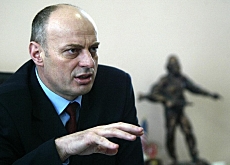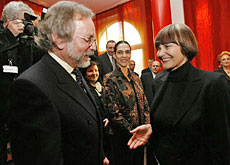Calmy-Rey outlines Swiss foreign priorities

President Micheline Calmy-Rey has "taken note" of the victory of the ultranationalist Serbian Radical Party (SRS) following Serbia's elections.
Addressing journalists in Geneva on Monday, Calmy-Rey, who is also Swiss foreign minister, referred to Switzerland’s mediation role between Syria and Israel, and touched on the tax dispute between Bern and the European Union.
“We shouldn’t imagine the worst,” she said, referring to the victory of the SRS, which won 28 per cent of the vote on Sunday. “One of the keys to the solution lies in the EU’s hands.”
The president also expressed her hope that the United Nations Security Council would take a decision over Kosovo. Last year, she made several calls for “formal independence” for Kosovo. The EU is due to take over from the UN in the troubled province.
For Calmy-Rey, Switzerland has key competences in the protection of minorities and managing the past, “which is essential to help resolve all kinds of problems”.
Switzerland will also continue to play an active role in providing humanitarian and development assistance to the region, she explained.
Go-between
The president also confirmed that Switzerland was acting as a mediator in talks between Israel and Syria, as revealed by the press last week.
She explained that a top Swiss diplomat was currently in Syria and that senior foreign ministry official Michael Ambühl “will travel there this week”. But she refused to divulge any further details.
Last week Washington denied that Israel and Syria had held secret talks over the question of the Golan Heights ahead of a possible peace deal, as described by the Israeli newspaper Haaretz. According to Haaretz, informal agreements had been reached during secret talks between Israel and Syria in Europe.
The newspaper said Israel would withdraw progressively from the Golan Heights, captured from Syria in 1967. In exchange Syria would end its support for anti-Israel militant groups and distance itself from Iran.

More
President of the Confederation
Taxation
Calmy-Rey also reiterated her position on the ongoing tax dispute between Switzerland and the EU that there was nothing to be negotiated.
Brussels and Bern have been at loggerheads for more than a year over low corporate taxes some of the cantons use to attract new companies, including firms from EU countries.
“Switzerland is not an EU member and doesn’t have equal access to the large market. There is no free circulation in terms of agriculture and services, and therefore no reason to negotiate on taxation,” she repeated.
She stressed that Swiss laws were “decided by the people” and therefore for them to modify if necessary, but added that “this was not the case at present”.
The president also defended the new UN Human Rights Council, while acknowledging that it had experienced “difficulties”.
“It’s a positive thing that the council has been established in Geneva. It’s a body with more importance in the UN system than the former commission,” she noted.
She said that the council should also “set the rules”, but again refused to imagine the worst.
“We do not want a court that accuses, as the commission used to do. We want to work in partnership and make progress together,” she added. “The council should not be a club for good students who point their fingers at the bad ones.”
swissinfo with agencies
Micheline Calmy-Rey was born in Chermignon in Canton Valais on July 8, 1945.
She is married with two children and has a degree in political science from the Graduate Institute of International Studies in Geneva.
Calmy-Rey who is a member of the centre-left Social Democratic Party, keeps her foreign ministry portfolio during the one-year presidential post.
She is only the second woman president in Swiss history after Ruth Dreifuss who served a term in 1999.
Micheline Calmy-Rey, who assumed the one-year ceremonial presidential post on January 1, 2007, also outlined her priorities for Switzerland on Monday.
During the year she plans to meet the Swiss people to listen closely to what they have to say. On February 1, she will travel to Monthey in canton Valais, which has recently been hit by violence between different foreign communities.
There she hopes to highlight the issue of integration, which will be one of the central parts of her presidential year.
Calmy-Rey has also chosen to stress the importance of integration at work. Although Switzerland has one of the lowest levels of unemployment in the world, many people are afraid of being excluded from the workplace.

In compliance with the JTI standards
More: SWI swissinfo.ch certified by the Journalism Trust Initiative










You can find an overview of ongoing debates with our journalists here . Please join us!
If you want to start a conversation about a topic raised in this article or want to report factual errors, email us at english@swissinfo.ch.